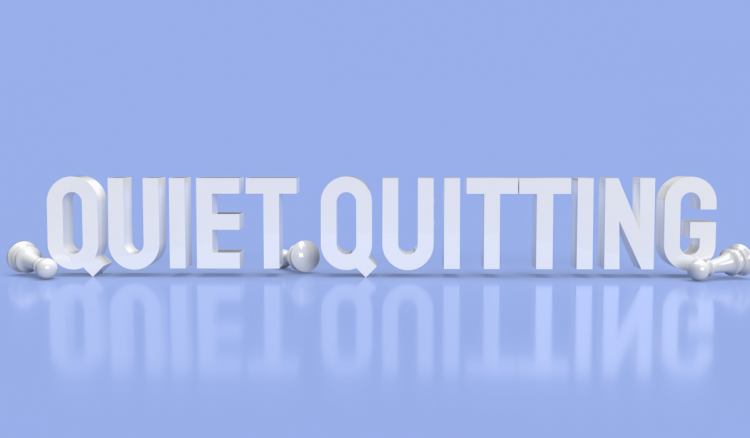The term “quiet quitting” came into the pseudo-professional zeitgeist this past year from the source of all cultural progress and discord–TikTok.
Since then, quiet quitting has undoubtedly embedded your news feeds, and LinkedIn follows as the discussion—or deconstruction– on the future of work continues.
But what is quiet quitting? And more importantly, what does quiet quitting mean for you as a founder (or future founder)?
What Does Quiet Quitting Mean?
To understand what is quiet quitting, you need to understand what it isn’t.
Even though it includes “quit,” the phrase isn’t about quitting your job. It’s also not about half-assing your work or going throughout the day with an attitude like George Costanza. Actually, it’s more about viewing your job as a supporting player in the cast of your life.
Quiet quitting is about working efficiently, completing your assigned tasks, then closing your laptop at 5pm to put energy into your life outside work. Instead of work being the No.1 priority in your life, it’s more of a means to an end.
Essentially, the phrase is an evolution, or rephrasing, of work-life balance.
Before the Covid-19 pandemic, the work structure, specifically in the Western world, hadn’t evolved much since the 1950s. Computers replaced typewriters, and common areas usurped cubicles, but the system of clocking into a physical location for a set period was still standard.
Then overnight, everything changed.
The business world is far from a consensus of understanding healthy and efficient work. However, a recent McKinney study found that 58% of American workers can work remotely in some capacity, so the trend isn’t changing.
But for many younger workers that have been abruptly thrown into an era of business where you a tap away from your work, quiet quitting is not only good but necessary.
In some ways, the phenomenon is a response to the pressures remote work has unintentionally put on professionals that work in an industry where the primary tool is a laptop or phone.
And it makes sense. Why should you sacrifice extra hours on a Zoom call or miss out on your niece’s birthday just to help someone else make money?
But if you’re reading this, you probably aren’t in the business of working for someone else. So what is quiet quitting for someone like you?
What Does It Mean for Entrepreneurs?
You’ll recognize the cliche words used in startup culture–grind, hustle, uncompromising, unicorn, and disruptor, to name a few.
Entrepreneurship’s connotation is the opposite of quiet quitting.
Don’t believe us? Watch our exclusive interview with LinkedIn founder Reid Hoffman below to learn why he thinks work-life balance is impossible.
So is quiet quitting something entrepreneurs can do?
No.
If you’re an entrepreneur, your business is more than a job–it’s you.
Your business is a reflection of yourself because it wouldn’t exist otherwise. That’s why quiet quitting is inherently impossible for entrepreneurs because you’ll never be able to close your laptop and walk away from thinking, living, and breathing your business.
But that doesn’t mean you and your team should work until you collapse. Unfortunately, the entrepreneurship community naturally glorifies founders that sacrifice everything for success. Unless you don’t care about your relationships, hobbies, or community, you need to learn your limits. It might ebb and flow as your business grows, but the time and energy you sacrifice have a breaking point.
Even the best entrepreneurs take a vacation.
So get a mentor, and listen to your trusted friends, colleagues, and advisors. They’ll help you realize when burnout is creeping into your business, so you can take steps to better yourself. A healthy founder typically equates to a healthy business.
So, as an entrepreneur, quiet quitting isn’t something you’re naturally inclined to do. But the sentiment of the term still applies to balancing your mental and physical health with the success of your business.
Is Quiet Quitting OK for My Business?
Speaking of your business, if you’re not quiet quitting but your team members are, does that mean you’re doomed for failure?
Quiet quitting benefits your business if you’ve set a culture focused on work-life balance. It means your employees can separate their work from the essential things in their life. And as we learned, healthy people tend to lead to healthy businesses.
The counterargument of quiet quitting is that it’s not good for business because it encourages laziness and a lack of innovation. But, like most things in business and life, too much of a good thing is a slippery slope. Quiet quitting can be an excuse not to participate in meetings, bring new ideas to the business, or solve problems.
Here are the extreme reactions to quiet quitting:
- Quiet quitting is bad for your business. Reaction: Track employees’ hours, monitor computer activity, and have multiple check-ins a day with a supervisor.
- Quiet quitting is good for your business. Reaction: Monitor task completion through a workflow tool, provide flexible hours, and let employees work on hobbies during business hours.
That’s why there’s so much debate about quiet quitting. If you allow it, your employees might be healthier and happier, but you may sacrifice innovation. On the other hand, if you strike down with a vengeance on quiet quitting, you’ll risk alienating your employees or inducing burnout in the ones who care.
If you notice the side effects of quiet quitting in your business, it might be your fault.
So when your leadership team or cofounder asks, “what is quiet quitting, and how can we stop it?” here are questions to ask back:
- Are we giving opportunities for growth to employees (financially and professionally)?
- What are we rewarding our employees for?
- How do we define good work?
- Do we need more or less supervision of employees?
- Are we asking how people are feeling about their work and following up?
- Are we setting a bad example of work-life balance?
- Are we hiring people aligned with our mission or here for a paycheck?
- Are we transparent about where the business is headed?
- What’s more important–ideas or deadlines?
- How can we show and tell that employees matter?
Quiet quitting may be a fad for now, but it’s pointing to a larger discussion that’s been around longer than TikTok.
What does a healthy work lifestyle look like for you and your employees?
As a founder, it’s up to you to find out.
Read more: What Is Ikigai? The Japanese Methodology That Will Change Your Business
Are You Quiet Quitting? Here’s Something Better.
Are your after-hours filled working on a side hustle? Do you daydream about logos during meetings? Is your lunch break spent researching business ideas? Then you’re ready to stop quiet quitting and start loud quitting.
At foundr, we know all about building your own path. It’s the first step in looking for purpose over profit and working for you instead of living. Don’t work for someone else’s dream–build yours.
Click here, and we’ll show you how.
Source by foundr.com











